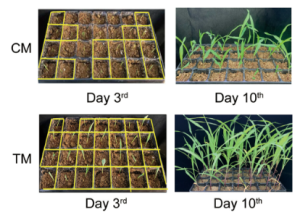A group from Jiangsu Collaborative Innovation Center for Solid Organic Wastes, Educational Ministry Engineering Center of Resource-Saving Fertilizers, Nanjing Agricultural University, Nanjing, China has reported about Trichoderma Coating on maize and watermelon.
https://pubmed.ncbi.nlm.nih.gov/37195176/
In this study, the fungus Trichoderma guizhouense NJAU4742 was introduced to both maize and watermelon seed microbiomes by seed coating, and it was shown that seed coating on watermelon and maize with Trichoderma sp. improves plant growth and rhizosphere soil enzyme activities significantly.
The germination rate of coated seeds were significantly increased by 25% for maize after 3 days postplanting and 35% for watermelon after 8 days postplanting, compared with the control.
 effects of tricodelma coating on maize
effects of tricodelma coating on maize
Compared with the control, the enzyme activities of urease, sucrase, acid phosphatase, alkaline phosphatase, α-glucosidase, peroxidase, and cellulase increased by 97.9%, 51.7%, 38.3%, 51.6%, 61.2%, 82.3%, and 27.0%, respectively, in the coated maize, and the enzyme activities of sucrase, acid phosphatase, neutral phosphatase, α-glucosidase, peroxidase, polyphenol oxidase, and cellulase increased by 51.7%, 25.7%, 21.1%, 62.6%, 39.1%, 34.3%, and 32.8%, respectively, in the coated watermelon.
The incidence of maize stalk rot in the coated treatment was significantly reduced by 28% compared with that in the control, and the incidence of watermelon with coating was reduced by 37% at 60 days after pathogen application.
